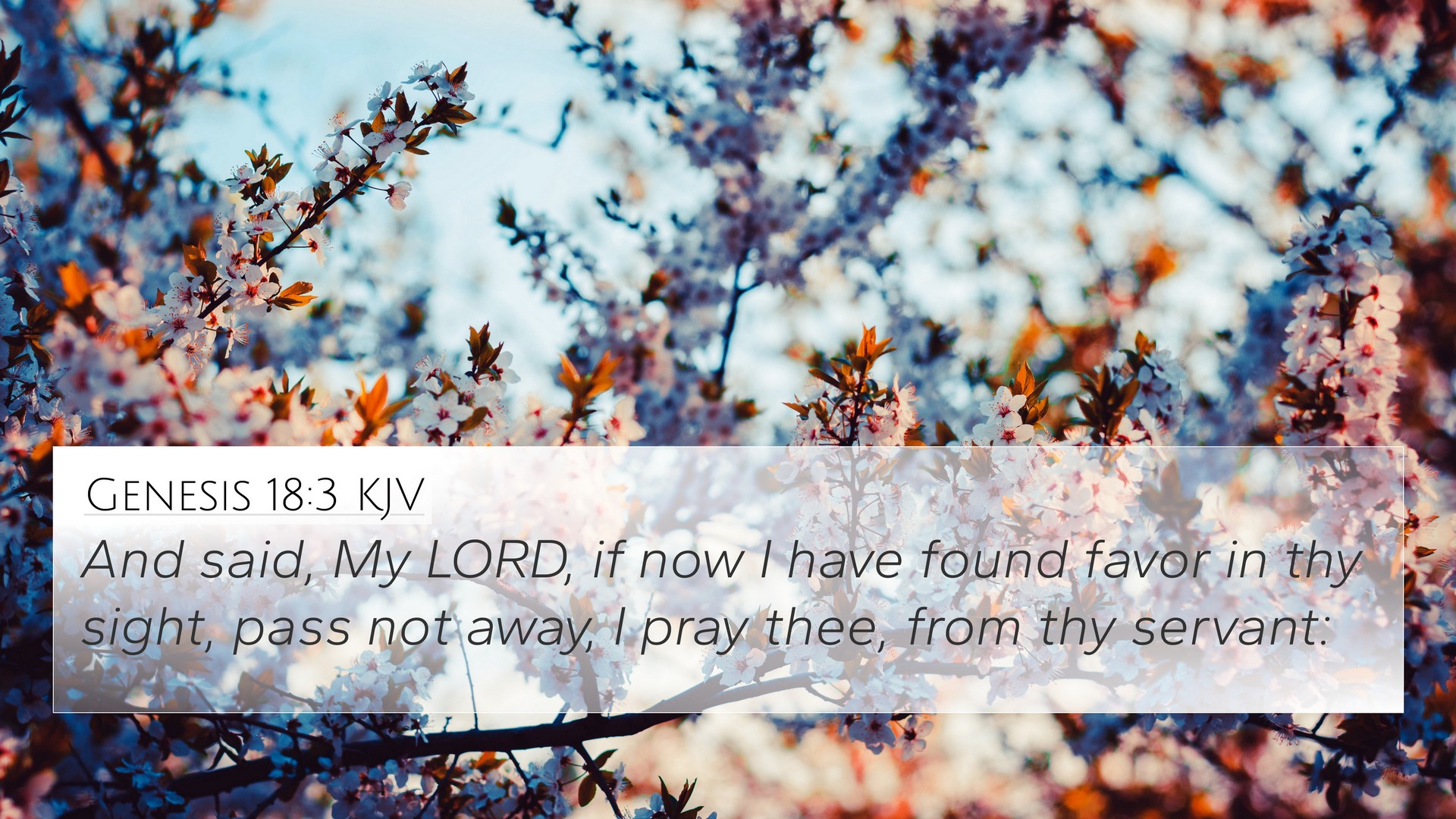Understanding Genesis 18:3
Bible Verse: “And said, My Lord, if now I have found favour in thy sight, pass not away, I pray thee, from thy servant:” (Genesis 18:3)
This verse comes from a pivotal moment in the story of Abraham, where he encounters divine visitors. The significance of this encounter is multilayered, revealing themes of hospitality, reverence, and divine favor.
Key Themes and Insights
- Hospitality: Abraham demonstrates exemplary hospitality, inviting the visitors to rest and be refreshed. This is viewed as a critical virtue in the Biblical narrative.
- The Nature of Divine Interactions: The verse signifies an intimate moment between Abraham and the Lord, highlighting the personal relationship that believers are called to have with God.
- Intercession: Abraham's language suggests reverence and the approach of a servant, displaying his willingness to serve and his recognition of the divine authority he is addressing.
Public Domain Commentary Insights
Insights from Matthew Henry, Albert Barnes, and Adam Clarke highlight various dimensions of this verse:
Matthew Henry's Commentary
Henry emphasizes Abraham's humility and his powerful recognition of divine presence. He discusses how Abraham's appeal for favor illustrates the relationship dynamics between man and God, presenting a call for humility and gratitude in prayer.
Albert Barnes' Commentary
Barnes reflects on the importance of Abraham's hospitality as a reflection of faith. He notes that this act of welcoming the visitors is a precursor to the significant revelation that follows regarding the impending judgment on Sodom and Gomorrah, linking the importance of hospitality with divine revelation.
Adam Clarke's Commentary
Clarke puts forth the notion that Abraham's request showcases not just politeness but also deep-seated faith. He views this interaction as symbolic of God's continual engagement with humanity and the importance of being receptive to divine presence.
Cross-References: Related Biblical Texts
- Hebrews 13:2: “Be not forgetful to entertain strangers: for thereby some have entertained angels unawares.” - This verse emphasizes hospitality, echoing Abraham's actions.
- Genesis 18:1: “And the LORD appeared unto him in the plains of Mamre...” - This is the context leading to Abraham’s plea for favor.
- Luke 10:38-42: The story of Martha and Mary reflects hospitality towards Jesus and underscores the importance of receiving the Lord.
- Romans 12:13: “Distributing to the necessity of saints; given to hospitality.” - A call for believers to embody the spirit of hospitality.
- Acts 16:15: The baptism of Lydia shows the importance of welcoming God’s servants into one’s home.
- Genesis 24:32: The servant of Abraham asked for hospitality when seeking a wife for Isaac, showing a lineage of valuing hospitality.
- Psalm 84:10: “For a day in thy courts is better than a thousand...” - Reflects the esteem for being in the presence of God.
Connecting Genesis 18:3 to Broader Biblical Themes
The verse can be interpreted in the context of various Biblical themes through cross-referencing:
- Faith and Obedience: Abraham's life is a testament to faith, and his interaction here is a reflection of his long-standing obedience to God's commands.
- Divine Revelation: This moment serves as a precursor to the revelation of God's plan for cities like Sodom, reminding believers of the seriousness of God's intentions.
- Prayer and Petition: Abraham's address demonstrates the model of earnest prayer, where humility precedes requests made to God.
Conclusion
Genesis 18:3 serves as an introductory point to a larger narrative that illuminates the character of Abraham, the importance of hospitality, and the relationship between man and God. Through examining this verse and its significant cross-references, one can appreciate the intricate connections within the scriptures that form a greater understanding of faith, divine interaction, and the call to obedience and service in the life of a believer.
For those studying the scriptures, this presents a rich tapestry of thematic connections across both the Old and New Testaments, underpinning the cohesive nature of Biblical teachings. Engaging with these verses facilitates a deeper understanding of God’s unfolding plan through inter-Biblical dialogues.



